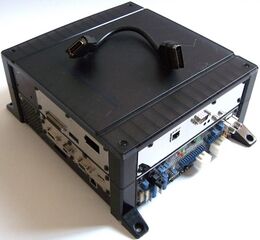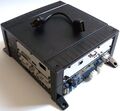Difference between revisions of "Sega Chihiro"
From Sega Retro
m (Text replacement - "logos=\[\[File:(.*).png.*" to "| logo=$1.png") |
|||
| (9 intermediate revisions by 4 users not shown) | |||
| Line 4: | Line 4: | ||
| imgwidth=320 | | imgwidth=320 | ||
| name= | | name= | ||
| − | | maker=[[Sega]] | + | | maker=[[Sega Corporation (2000-2015)|Sega]] |
| variants=Chihiro Satellite Terminal | | variants=Chihiro Satellite Terminal | ||
| add-ons= | | add-ons= | ||
| processor=Pentium III | | processor=Pentium III | ||
| releases={{releasesArcade | | releases={{releasesArcade | ||
| − | | | + | | system_date_jp=2002 |
| + | | system_date_us=2003 | ||
| + | | system_date_uk=2003 | ||
}} | }} | ||
}} | }} | ||
| − | The ''' | + | The '''Chihiro''' (チヒロ) is an arcade system produced by [[Sega]] and [[Microsoft]] based on the [[Xbox]] home video game console{{ref|https://web.archive.org/web/20071118203705/http://sega.jp/corp/release/2002/0918/}}, and it was named after the protagonist of Studio Ghibli's [[wikipedia:Spirited Away|Spirited Away]] movie. It was the second such partnership, with Sega also siding with [[Namco]] and [[Nintendo]] with the [[Nintendo GameCube]]-powered [[Triforce]] system. |
| + | |||
| + | ''[[The House of the Dead III]]'' was the first game to launch for the platform in late 2002. | ||
| + | |||
| + | ==Hardware== | ||
| + | The Chihiro is based upon the [[Xbox]], using the same Pentium III CPU and NVIDIA graphics card. Unlike the Xbox however it uses [[GD-ROM]] media instead of DVDs (with some exceptions; see below), has more RAM and an earlier revision chipset which is used in the Xbox debugging unit (MCPX2). Because of the similar hardware, it is in theory relatively easy to port Chihiro games to the Xbox and PC. The GD-ROM board can be configured to store up to 1GB of data from the GD-ROM like with the [[Triforce]]. | ||
There was also a Satellite Terminal version of the Chihiro. | There was also a Satellite Terminal version of the Chihiro. | ||
| − | ==Technical specifications== | + | ===Technical specifications=== |
* CPU: Intel Pentium III 733MHz (133MHz FSB) | * CPU: Intel Pentium III 733MHz (133MHz FSB) | ||
* Graphics: [[NVIDIA]] XChip 200MHz (based on the NVIDIA GeForce 3) with NV2A architecture | * Graphics: [[NVIDIA]] XChip 200MHz (based on the NVIDIA GeForce 3) with NV2A architecture | ||
| Line 24: | Line 31: | ||
==List of games== | ==List of games== | ||
| − | ===Chihiro | + | ===Chihiro=== |
{{multicol| | {{multicol| | ||
| − | + | {{CargoReleaseList | |
| − | + | | table=releases | |
| − | + | | query=console="CHIHIRO" | |
| − | + | | orderby=date | |
| − | + | }} | |
| − | + | }} | |
| − | |||
| − | |||
| − | |||
| − | |||
| − | |||
| − | |||
| − | ===Chihiro | + | ===Chihiro Sattelite Terminal=== |
{{multicol| | {{multicol| | ||
| − | + | {{CargoReleaseList | |
| − | + | | table=releases | |
| − | + | | query=console="CHIHIROST" | |
| + | | orderby=date | ||
| + | }} | ||
| + | }} | ||
*''[[Mobile Suit Gundam 0079 Card Builder]]'' (2005) | *''[[Mobile Suit Gundam 0079 Card Builder]]'' (2005) | ||
*''[[Mobile Suit Gundam 0083 Card Builder]]'' (2007) | *''[[Mobile Suit Gundam 0083 Card Builder]]'' (2007) | ||
| − | + | ||
| − | + | ==Production credits== | |
| − | * | + | {{creditstable| |
| − | + | *[[Hiroshi Yagi]] | |
| − | + | | source=Developer mentions{{ref|https://web.archive.org/web/20210205150032/https://www.4gamer.net/games/999/G999905/20210126043/}} | |
| − | + | | console=Arcade | |
| − | + | }} | |
| − | |||
| − | |||
| − | | | ||
==Photo gallery== | ==Photo gallery== | ||
| Line 61: | Line 62: | ||
chihiro_system.jpg|System | chihiro_system.jpg|System | ||
chihiro_router.jpg|Network router | chihiro_router.jpg|Network router | ||
| + | </gallery> | ||
| + | |||
| + | ==Promotional material== | ||
| + | <gallery> | ||
| + | PressRelease UK 2003-02-12.pdf|UK press release | ||
</gallery> | </gallery> | ||
Latest revision as of 11:56, 16 November 2024

| |||||||||||||||||

| |||||||||||||||||
| Sega Chihiro | |||||||||||||||||
|---|---|---|---|---|---|---|---|---|---|---|---|---|---|---|---|---|---|
| Manufacturer: Sega | |||||||||||||||||
| Variants: Chihiro Satellite Terminal | |||||||||||||||||
|
The Chihiro (チヒロ) is an arcade system produced by Sega and Microsoft based on the Xbox home video game console[1], and it was named after the protagonist of Studio Ghibli's Spirited Away movie. It was the second such partnership, with Sega also siding with Namco and Nintendo with the Nintendo GameCube-powered Triforce system.
The House of the Dead III was the first game to launch for the platform in late 2002.
Contents
Hardware
The Chihiro is based upon the Xbox, using the same Pentium III CPU and NVIDIA graphics card. Unlike the Xbox however it uses GD-ROM media instead of DVDs (with some exceptions; see below), has more RAM and an earlier revision chipset which is used in the Xbox debugging unit (MCPX2). Because of the similar hardware, it is in theory relatively easy to port Chihiro games to the Xbox and PC. The GD-ROM board can be configured to store up to 1GB of data from the GD-ROM like with the Triforce.
There was also a Satellite Terminal version of the Chihiro.
Technical specifications
- CPU: Intel Pentium III 733MHz (133MHz FSB)
- Graphics: NVIDIA XChip 200MHz (based on the NVIDIA GeForce 3) with NV2A architecture
- System Chipset: NVIDIA MCPX2
- RAM: 128MB DDR SDRAM at 200MHz
- Polygons: 125M polys/sec
List of games
Chihiro
- The House of the Dead III (2002)
- Wangan Midnight: Maximum Tune (2003)
- Crazy Taxi 3: High Roller (2003)
- Virtua Cop 3 (2003)
- OutRun 2 (2003)
- Wangan Midnight: Maximum Tune 2 (2004)
- Ollie King (2004)
- Ghost Squad (2004)
- OutRun 2 SP (2004)
- Kidou Senshi Gundam Battle Operating Simulator (2005)
Chihiro Sattelite Terminal
- Sega Network Taisen Mahjong MJ2 (2004)
- Quest of D (2004)
- Sega Golf Club (2004)
- Quest of D: Gofu no Keisyousya (2005)
- Quest of D: Oukoku no Syugosya (2005)
- Sangokushi Taisen (2005)
- Sega Network Taisen Mahjong MJ3 (2005)
- Sega Golf Club Ver. 2006 Next Tours (2006)
- Sangokushi Taisen 2 (2006)
- Sega Network Taisen Mahjong MJ3 Evolution (2007)
- Quest of D: The Battle Kingdom (2007)
Production credits
Photo gallery
Promotional material
References
- ↑ http://sega.jp/corp/release/2002/0918/ (Wayback Machine: 2007-11-18 20:37)
- ↑ https://www.4gamer.net/games/999/G999905/20210126043/ (Wayback Machine: 2021-02-05 15:00)
| Sega arcade boards |
|---|
| Originating in arcades |
|
77
78
79
80
81
82
83
84
85
86
87
88
89
90
91
92
93
94
95
96
97
98
99
|
| Console-based hardware |
|
84
85
86
87
88
89
90
91
92
93
94
95
96
97
98
99
00
01
02
03
04
05
06
07
08
09
10
11
12
13
14
|
| PC-based hardware |
|
05
06
07
08
09
10
11
12
13
14
15
16
17
18
19
20
21
22
23
|


